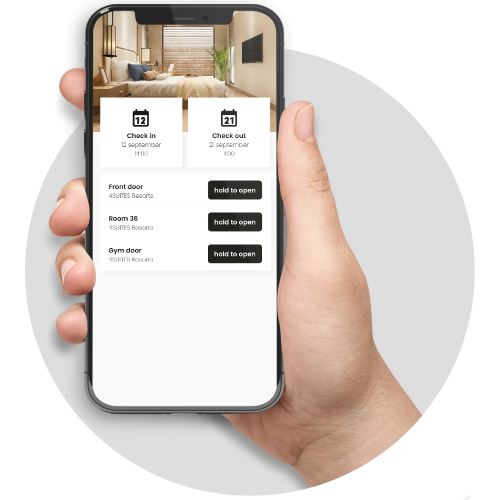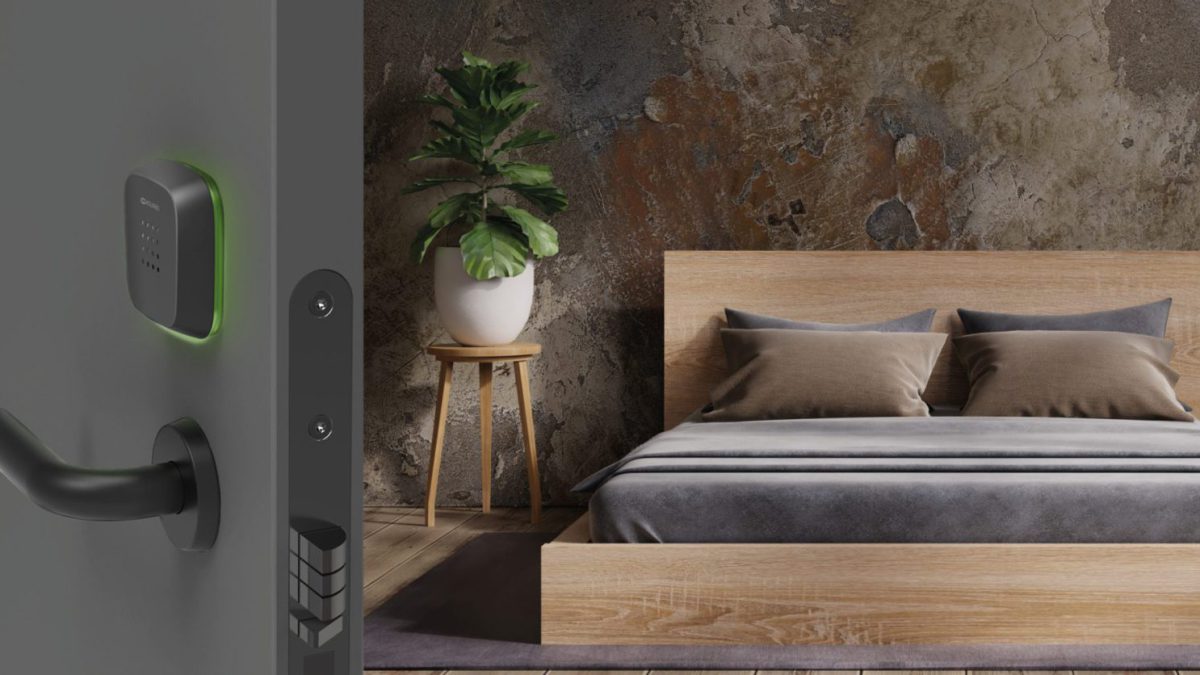Mobile hotel keys are electronic keys that are used to access hotel rooms. These keys are typically linked to a guest’s reservation and can be used in place of traditional mechanical keys. Hotel digital keys may be used in a variety of ways, such as through a smartphone app or by using a key card. Some digital hotel keys may even be programmed to automatically unlock the door when a guest approaches, providing a convenient and secure way for guests to access their hotel room.
How have hotel keys evolved?
It started with metal hotel keys
Hotel keys have undergone a transformation from traditional metal keys to electronic keys. Initially, hotels used metal keys to unlock the doors to guest rooms, but they were often large and bulky, and could be easily lost or stolen. These keys presented two main problems for hotels: security concerns due to lost or stolen keys, and the inconvenience of using metal keys. In the past, hotel keys were usually large and had a room number printed on them which for obvious reasons created a big security risk. If a guest lost their key, the only solution was to replace the lock.
Hotels replaced metal keys with electronic key cards
Metal keys presented security concerns and inconvenience for hotels. To address these issues, hotels began to replace metal keys with electronic key cards, which use a magnetic strip or a chip to unlock a door when they are swiped or inserted into a card reader. Electronic key cards are more convenient and secure than traditional metal keys, as they cannot be easily duplicated and can be easily deactivated if they are lost or stolen.
Proximity cards revolutionised the hotel lock market
The introduction of proximity cards revolutionized hotel security by providing a convenient and easily managed means of accessing common areas and facilities. If a card was lost, it could be quickly deactivated at the reception desk to prevent unauthorized use. Additionally, proximity cards allowed guests to have more freedom and independence, as they did not need to request additional keys or access codes to enter certain areas of the hotel.
This system has been widely adopted by hotels globally and is still in use today, with some hotels opting to upgrade to electronic key locks for their ease of use. Wristbands are also frequently used as a means of access, particularly in all-inclusive resorts. The investment in implementing these systems is relatively low, and they are well-known and easy for guests to use. Additionally, proximity cards are often used in conjunction with energy-saving keycard switches, allowing hotels to optimize energy usage based on occupancy.
Bluetooth locks replace proximity cards in hotels
As digital technology advanced, many large hotels moved on to Bluetooth locks, which use a technology called Bluetooth Low Energy (BLE) to communicate with a smartphone or other device. Guests can use a hotel’s mobile app to check in and receive a digital key that can be used to unlock their room’s door. The digital key is sent to the guest’s smartphone via Bluetooth, and the guest can then use the phone to unlock the door by holding it near the lock. This eliminates the need for physical keys or keycards and allows guests to check in and access their rooms more easily.
IoT enabled hotel access: the future of hotel room access
 The future of hotel room access is cloud-based mobile keys, where data is stored and protected in the cloud, providing guests with keyless access to their room, which provides convenience to them and frees up receptionists from repetitive tasks such as encoding a keycard.
The future of hotel room access is cloud-based mobile keys, where data is stored and protected in the cloud, providing guests with keyless access to their room, which provides convenience to them and frees up receptionists from repetitive tasks such as encoding a keycard.
The key advantage of cloud based mobile keys is that the data is stored and protected in the cloud, this increases security and allows receptionists to program or revoke access remotely. It also means that there is no need for guests to download an App to access their room, they can open their room by clicking the link that they received as part of their reservation confirmation.
Find out more about how keyless access redefines the role of the receptionist.
Cloud-based access enables remote access control and role-based access management
Cloud-based access management is a technology that provides role-based access control, allowing different groups of users to access specific areas of a property with varying degrees of restriction. For example in a staffless hotel, guests are able to access the hotel entrance two hours prior to accessing their room, but they may also check out of the room (have their access rights to the room revoked) and leave their luggage at the hotel, allowing them to explore the city before returning to collect their belongings (only having access to open the hotel front door and luggage room). The wellness area may have separate access restrictions or is only accessible during opening hours. The hotel management could give their employees only access during their shift. All of these access permissions are managed through the 4SUITES Manager, which gives the hotel complete control over who can enter and when.
The 4SUITES Manager is an innovative and robust cloud platform that provides real-time management of all 4SUITES access products in your hotel. It offers a convenient web-based interface, eliminating the need for any local installations. This platform provides real-time information and updates on lock status, enabling hotel managers to have complete control and visibility over their access systems. The 4SUITES Manager also offers the ability to manage both keycards and mobile keys from a single platform, making it easier to manage access permissions for guests and staff. Additionally, the 4SUITES Manager includes a PMS gate for automation, allowing for seamless integration with other hotel management systems, further streamlining operations and improving efficiency.
Smart IoT hotel keys via Google Wallet
Guests staying at any hotel that has installed 4SUITES’ smart IoT locks are able to use their Android devices to unlock their rooms and gain access to common areas such as gyms, pools, and lifts. Guests receive a mobile key with their hotel reservation email, which they can add directly to Google Wallet (like what is already common practice with train, and airplane tickets and loyalty cards) or alternatively choose to use a WebApp. The key remains activated throughout their stay and is automatically updated when guests want to change their room or extend their stay. This is done via seamless integration with the hotel’s PMS. When a guest wants to check out, the Google Wallet room key is remotely deactivated and archived.
How can hotels upgrade to cloud-based locks?
Hotels have the choice between replacing their locks with new ones, which gives them a wider option of choosing the design, or transforming their existing locks into intelligent, cloud connected devices with a quick upgrade of their existing doors.


